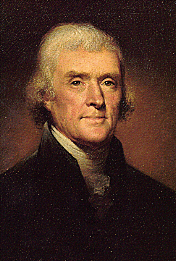
To Henry Lee, Monticello, May 8, 1825DEAR SIR, -- Your favor of Apr. 29 has been duly recieved, and the offer of mineralogical specimens from Mr. Myer has been communicated to Dr. Emmet our Professor of Natural history. The last donation of the legislature to the University was appropriated specifically to a library and apparatus of every kind. But we apply it first to the more important articles of a library, of an astronomical, physical, & chemical apparatus. And we think it safest to see what these will cost, before we venture on collections of mineral & other subjects, the last we must proportion to what sum we shall have left only. The Professor possesses already what he thinks will be sufficient for mineralogical and geological explanations to his school. I do not know how far he might be tempted to enlarge his possession by a catalogue of articles and prices, if both should be satisfactory. If Mr. Myer chuses to send such a catalogue, it shall be returned to you immediately, if the purchase be not approved. That George Mason was the author of the bill of rights, and the constitution founded on it, the evidence of the day established fully in my mind. Of the paper you mention, purporting to be instructions to the Virginia delegation in Congress, I have no recollection. If it were anything more than a project of some private hand, that is to say, had any such instructions been ever given by the convention, they would appear in the journals, which we possess entire. But with respect to our rights, and the acts of the British government contravening those rights, there was but one opinion on this side of the water. All American whigs thought alike on these subjects. When forced, therefore, to resort to arms for redress, an appeal to the tribunal of the world was deemed proper for our justification. This was the object of the Declaration of Independence. Not to find out new principles, or new arguments, never before thought of, not merely to say things which had never been said before; but to place before mankind the common sense of the subject, in terms so plain and firm as to command their assent, and to justify ourselves in the independent stand we are compelled to take. Neither aiming at originality of principle or sentiment, nor yet copied from any particular and previous writing, it was intended to be an expression of the American mind, and to give to that expression the proper tone and spirit called for by the occasion. All its authority rests then on the harmonizing sentiments of the day, whether expressed in conversation, in letters, printed essays, or in the elementary books of public right, as Aristotle, Cicero, Locke, Sidney, &c. The historical documents which you mention as in your possession, ought all to be found, and I am persuaded you will find, to be corroborative of the facts and principles advanced in that Declaration. Be pleased to accept assurances of my great esteem and respect. |
